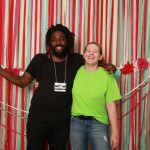~Post by Willa
Jason Reynolds’s first YA novel is entitled When I Was the Greatest came out in January and is the story of teenagers Ali, Noodles, and Needles and how their world changes.
Reynolds started writing poetry at age ten, and promised himself no matter what he would never be a novelist, but in his early twenties in New York City he lost a lot of money, lost his apartment, was struggling, and moved back home for a little while.
“I started to write longer forms of work. And I wrote this really bad novel, and you’ll never find it, you’ll never read it… Then I had this moment where I realized, ‘Yo I’m writing all these books and trying really hard to make sure they’re literary, and that they’re smart books. But none of it sounds like me.’”
Reynolds grew up in Brooklyn in a mainly African American neighborhood, and as a kid didn’t find novels that he identified with. “I didn’t quite understand it, because I had never read anything that sounded like me. Or looked like me,” Reynolds said. Shortly after he moved to writing prose, he understood that he needed to fill the gap in YA literature.
“I hung out with a buddy who’s a successful writer, and he took me the beach – his father was Walter Dean Meyers – he said ‘Listen, you know my father’s work, he’s 75, he’s not going to be able to do this for much longer. You should take over, and write these books for the kids growing up like you.’”
And so, Reynolds took on this task, and “took off his clothes”, portraying the people in his novels the way they actually are, rather than changing their language and culture to be like the rest of YA.
For young writers, his main suggestion is to read a lot, and read everything. “I think you should think about your stories.”
Reynolds said: “What I think teenagers don’t understand – or myself rather – is at sixteen, seventeen, I had lived long enough to have a story. And even if that story wasn’t some big magnanimous life changing thing, it was a story that I felt was worth telling.”

